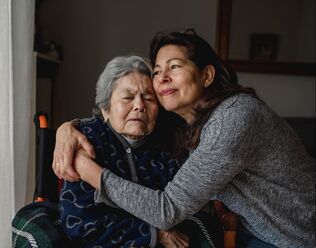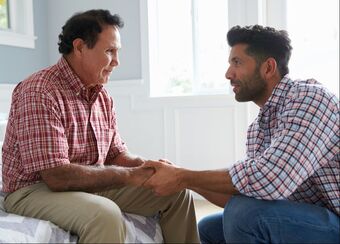My loved one was recently diagnosed with dementia. How can I help them in the early stages?1/21/2023 By: Nicole Ruggiano, PhD, MSW It is never easy for someone to receive a diagnosis of Alzheimer's disease or other type of dementia. In fact, research has shown that older adults are more afraid about dementia than they are afraid of cancer. It is normal for those who are diagnosed with dementia to experience a number of emotions, including fear about the future, anger, depression and denial. If your loved one has recently been diagnosed with a form of dementia and is having a hard time coping with their diagnosis, there are things that family and friends can do to help them in these early stages of their condition.
9 Comments
By, Nicole Ruggiano, PhD, MSW Caregiving can be a time intensive activity, and caregiving needs can sometimes be unpredictable. That can pose a lot of challenges for caregivers, who are often also full-time workers and have other family responsibilities. Even though most caregivers are happy that they are able to care for their loved one, caregiving can still be exhausting. How often do you feel tired at the end of the day? You are not alone! According to a recent study by the National Alliance for Caregiving and AARP, among caregivers of older adults:
By, Nancy Kusmaul, PhD, MSW Caring for another person can be rewarding, challenging, and overwhelming . Many caregivers choose to care for family members and friends out of a sense of love, or paying someone back for care they have received earlier in life. But what happens when you can no longer provide that care? There are many reasons that you might not be able to continue caring at home. Family leave in the United States is limited, and you may not be able to take any more time off from work. Certain diagnoses, like dementia, can make it hard to provide care, especially if the person needs supervision around the clock for their own safety. Caregivers need to eat and sleep too, and it can be difficult to be “always on” to make sure that someone with dementia does not get hurt. And sometimes someone’s physical needs are just too much, and the caregiver cannot lift, or move, or provide care without great risk to both the caregiver and the person in need of care. If this sounds familiar, you have not failed. However, when we care for those we love, we also need to deal with their, and our, emotions and expectations. It is very common for loved ones to have asked to “never put me in a nursing home” or for family members to have promised not to do so. But sometimes that is just not possible. By, Nicole Ruggiano, PhD, MSW When caregivers tell me how much their loved one's dementia symptoms upset them, they are most upset when their spouse or parent does not recognize them anymore. I understand this first hand. When my grandmother's dementia became severe, she would become scared and upset when I visited her. She didn't know who I was anymore. To her, I was a stranger who entered her home uninvited. There was nothing I could say to make her understand that I was her granddaughter. I even pointed to photographs of me that were hanging in her apartment to show that she did, in fact, know me. However, this didn't help and she remained agitated and scared. While this was an emotional process for me, it is a common symptom for people with dementia and is a result of the changes to the brain caused by Alzheimer's disease or other type of dementia. By, Nicole Ruggiano, PhD, MSW Caregiving is hard. It can be hard, physically and mentally. For many caregivers, this results in a mix of emotions from day to day. Even though it's challenging, caregivers often feel good about being able to provide care for their loved one. However, sometimes caregivers also feel guilty. Take Kim*, a 30-year old caregiver in in Birmingham, who talked about her experience with guilty feelings during an interview for one of our projects: Sometimes I feel like I’m not doing enough, but I don't know what else I can do. Then there’s the guilt. I think I have a lot of guilt about not recognizing more of my Dad's symptoms in the beginning. Even now, I think there’s a little bit of guilt that’s just surrounding the diagnosis itself. You’re watching somebody really decline. It could be two days, it could be another 10 years. |
Caregiving 101The Caregiving 101 is a resource for caregivers in Alabama who want to learn more about caregiving and dementia. Archives
August 2023
What would you like to learn more about?
All
|
205-348-4654

 RSS Feed
RSS Feed
